Biblical Analysis: Old Testament Theology Essay - [University Name]
VerifiedAdded on 2023/06/10
|5
|961
|218
Essay
AI Summary
This essay delves into the core tenets of Old Testament theology, examining the concept of holiness as inherent to God and the significance of various revelations, including God's role as Creator, Saviour, and Adjudicator. It explores the creation narrative, the importance of the death and resurrection of Christ and the four Hebrew terms for man. The essay further discusses the five steps involved in sacrificial rituals, the Israelites' rejection of pagan practices, and their embrace of new laws and rituals. Finally, it highlights the concepts of repentance and forgiveness within the context of Christian ethics and redemption.
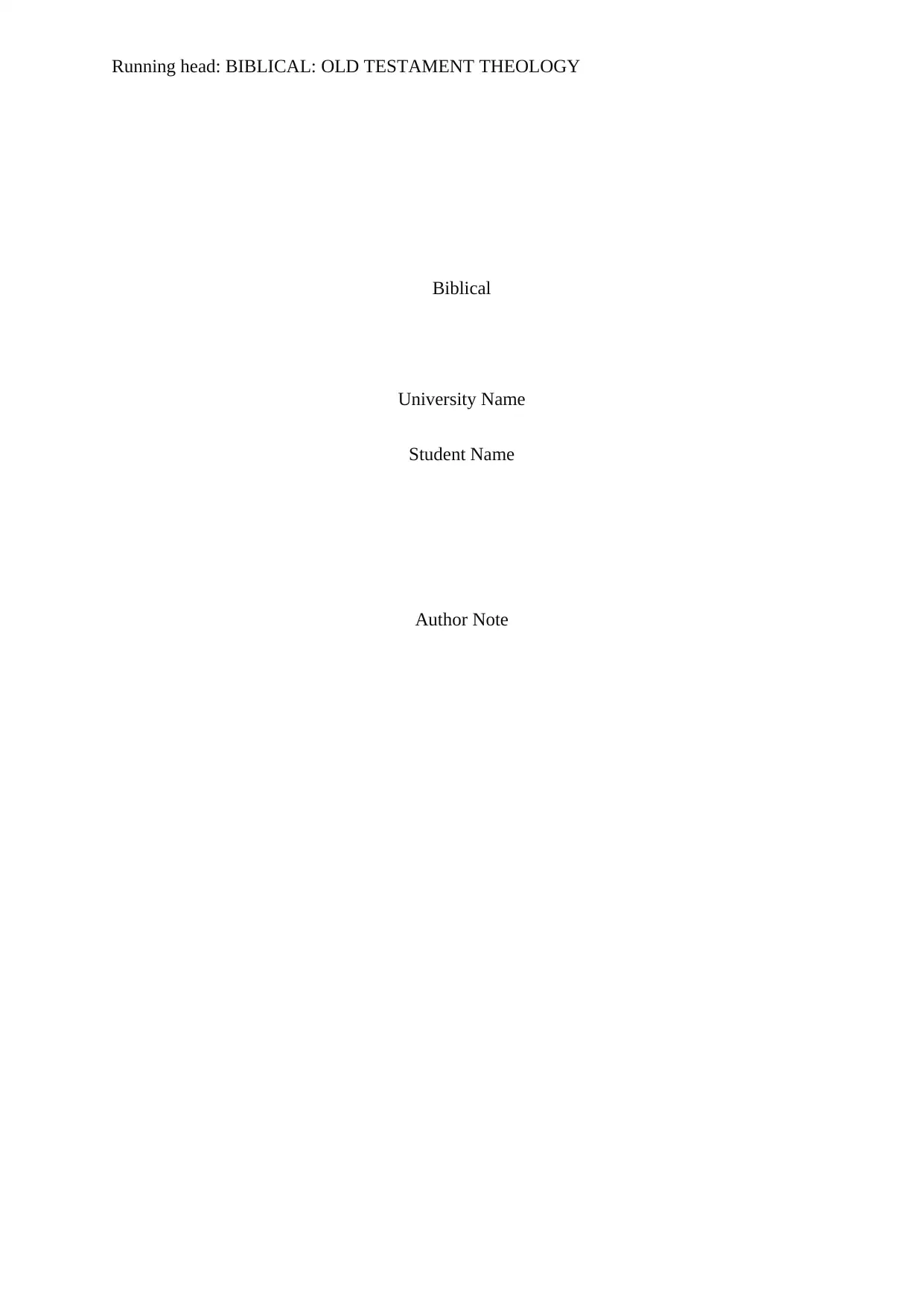
Running head: BIBLICAL: OLD TESTAMENT THEOLOGY
Biblical
University Name
Student Name
Author Note
Biblical
University Name
Student Name
Author Note
Paraphrase This Document
Need a fresh take? Get an instant paraphrase of this document with our AI Paraphraser
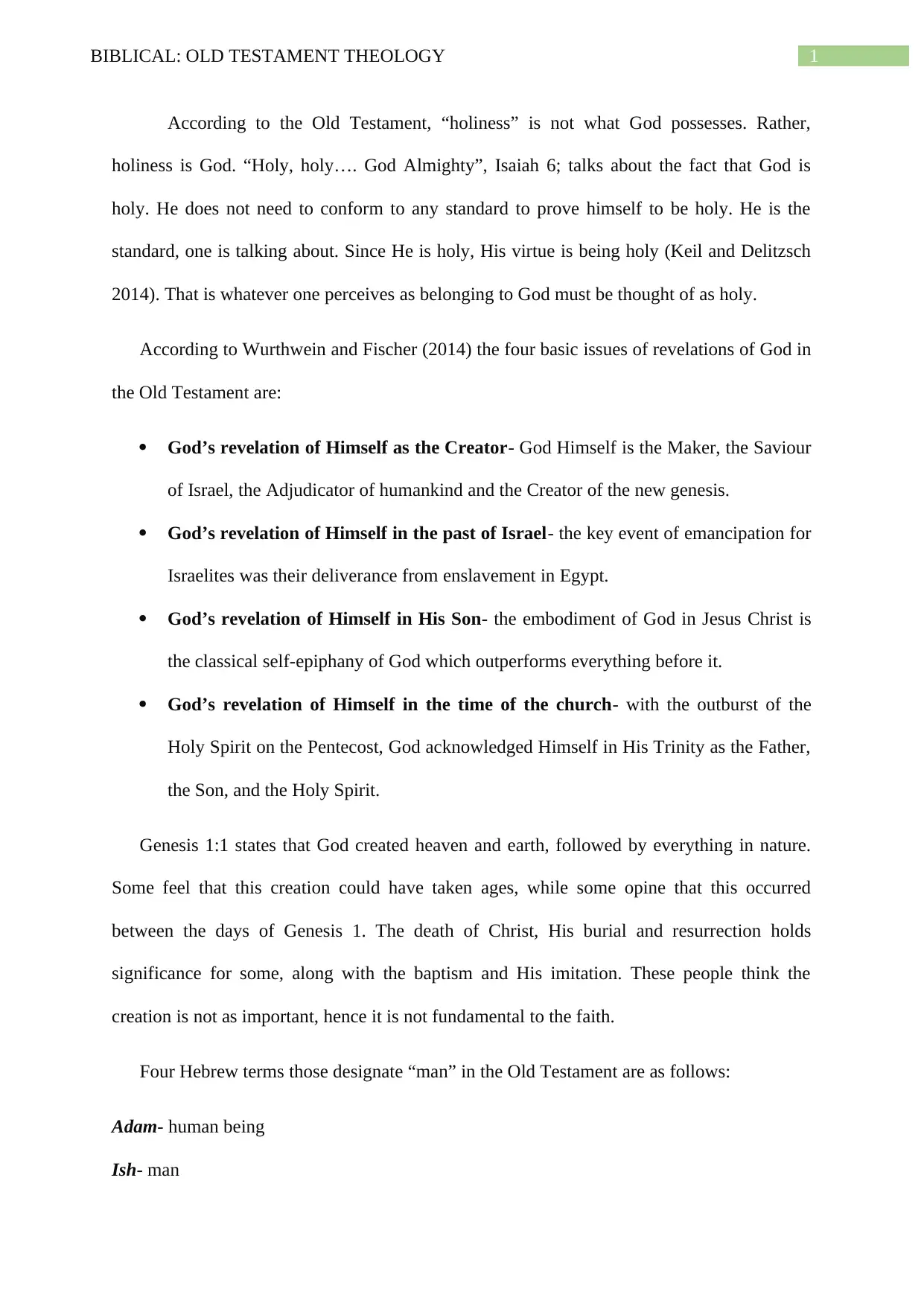
1BIBLICAL: OLD TESTAMENT THEOLOGY
According to the Old Testament, “holiness” is not what God possesses. Rather,
holiness is God. “Holy, holy…. God Almighty”, Isaiah 6; talks about the fact that God is
holy. He does not need to conform to any standard to prove himself to be holy. He is the
standard, one is talking about. Since He is holy, His virtue is being holy (Keil and Delitzsch
2014). That is whatever one perceives as belonging to God must be thought of as holy.
According to Wurthwein and Fischer (2014) the four basic issues of revelations of God in
the Old Testament are:
God’s revelation of Himself as the Creator- God Himself is the Maker, the Saviour
of Israel, the Adjudicator of humankind and the Creator of the new genesis.
God’s revelation of Himself in the past of Israel- the key event of emancipation for
Israelites was their deliverance from enslavement in Egypt.
God’s revelation of Himself in His Son- the embodiment of God in Jesus Christ is
the classical self-epiphany of God which outperforms everything before it.
God’s revelation of Himself in the time of the church- with the outburst of the
Holy Spirit on the Pentecost, God acknowledged Himself in His Trinity as the Father,
the Son, and the Holy Spirit.
Genesis 1:1 states that God created heaven and earth, followed by everything in nature.
Some feel that this creation could have taken ages, while some opine that this occurred
between the days of Genesis 1. The death of Christ, His burial and resurrection holds
significance for some, along with the baptism and His imitation. These people think the
creation is not as important, hence it is not fundamental to the faith.
Four Hebrew terms those designate “man” in the Old Testament are as follows:
Adam- human being
Ish- man
According to the Old Testament, “holiness” is not what God possesses. Rather,
holiness is God. “Holy, holy…. God Almighty”, Isaiah 6; talks about the fact that God is
holy. He does not need to conform to any standard to prove himself to be holy. He is the
standard, one is talking about. Since He is holy, His virtue is being holy (Keil and Delitzsch
2014). That is whatever one perceives as belonging to God must be thought of as holy.
According to Wurthwein and Fischer (2014) the four basic issues of revelations of God in
the Old Testament are:
God’s revelation of Himself as the Creator- God Himself is the Maker, the Saviour
of Israel, the Adjudicator of humankind and the Creator of the new genesis.
God’s revelation of Himself in the past of Israel- the key event of emancipation for
Israelites was their deliverance from enslavement in Egypt.
God’s revelation of Himself in His Son- the embodiment of God in Jesus Christ is
the classical self-epiphany of God which outperforms everything before it.
God’s revelation of Himself in the time of the church- with the outburst of the
Holy Spirit on the Pentecost, God acknowledged Himself in His Trinity as the Father,
the Son, and the Holy Spirit.
Genesis 1:1 states that God created heaven and earth, followed by everything in nature.
Some feel that this creation could have taken ages, while some opine that this occurred
between the days of Genesis 1. The death of Christ, His burial and resurrection holds
significance for some, along with the baptism and His imitation. These people think the
creation is not as important, hence it is not fundamental to the faith.
Four Hebrew terms those designate “man” in the Old Testament are as follows:
Adam- human being
Ish- man
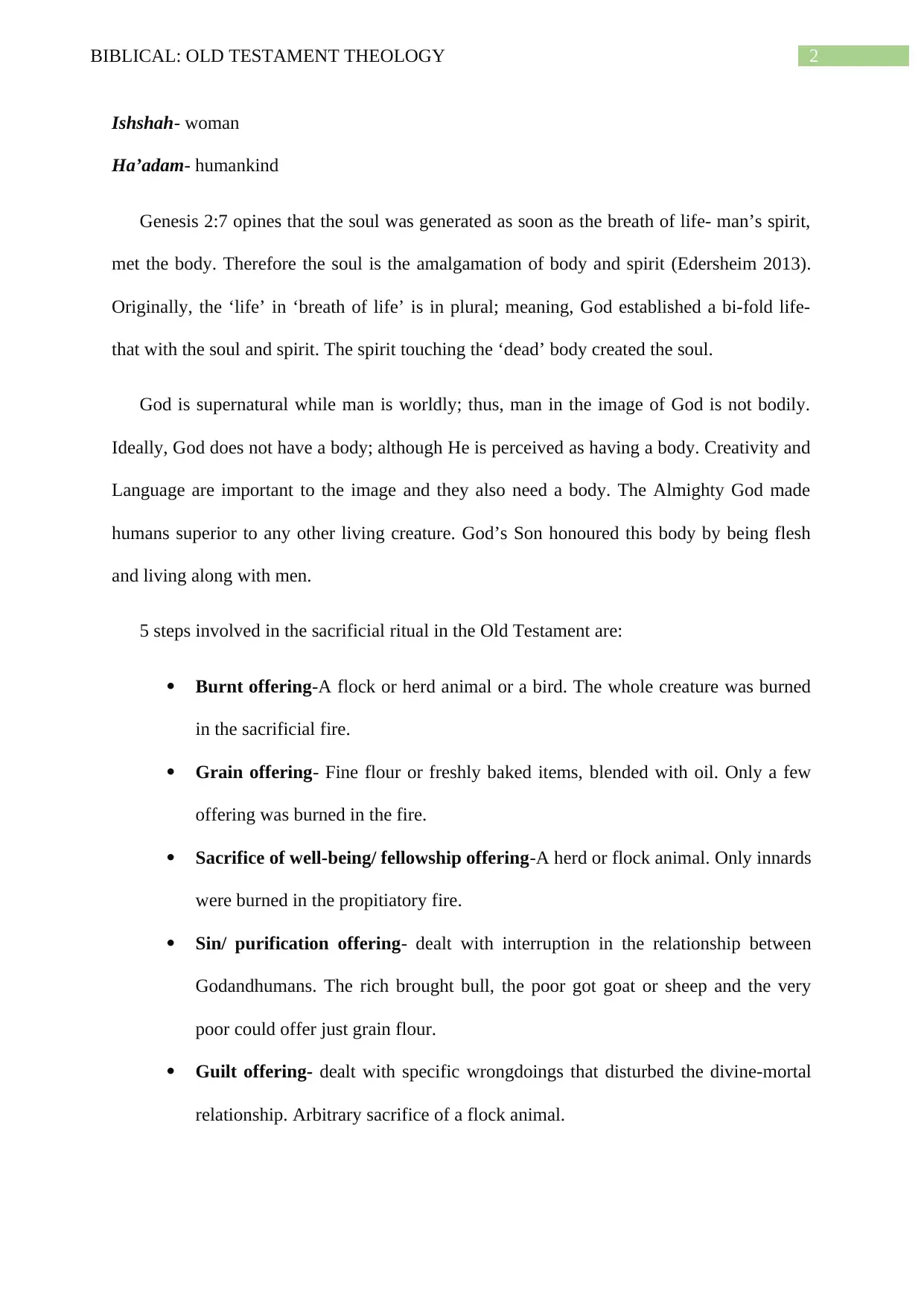
2BIBLICAL: OLD TESTAMENT THEOLOGY
Ishshah- woman
Ha’adam- humankind
Genesis 2:7 opines that the soul was generated as soon as the breath of life- man’s spirit,
met the body. Therefore the soul is the amalgamation of body and spirit (Edersheim 2013).
Originally, the ‘life’ in ‘breath of life’ is in plural; meaning, God established a bi-fold life-
that with the soul and spirit. The spirit touching the ‘dead’ body created the soul.
God is supernatural while man is worldly; thus, man in the image of God is not bodily.
Ideally, God does not have a body; although He is perceived as having a body. Creativity and
Language are important to the image and they also need a body. The Almighty God made
humans superior to any other living creature. God’s Son honoured this body by being flesh
and living along with men.
5 steps involved in the sacrificial ritual in the Old Testament are:
Burnt offering-A flock or herd animal or a bird. The whole creature was burned
in the sacrificial fire.
Grain offering- Fine flour or freshly baked items, blended with oil. Only a few
offering was burned in the fire.
Sacrifice of well-being/ fellowship offering-A herd or flock animal. Only innards
were burned in the propitiatory fire.
Sin/ purification offering- dealt with interruption in the relationship between
Godandhumans. The rich brought bull, the poor got goat or sheep and the very
poor could offer just grain flour.
Guilt offering- dealt with specific wrongdoings that disturbed the divine-mortal
relationship. Arbitrary sacrifice of a flock animal.
Ishshah- woman
Ha’adam- humankind
Genesis 2:7 opines that the soul was generated as soon as the breath of life- man’s spirit,
met the body. Therefore the soul is the amalgamation of body and spirit (Edersheim 2013).
Originally, the ‘life’ in ‘breath of life’ is in plural; meaning, God established a bi-fold life-
that with the soul and spirit. The spirit touching the ‘dead’ body created the soul.
God is supernatural while man is worldly; thus, man in the image of God is not bodily.
Ideally, God does not have a body; although He is perceived as having a body. Creativity and
Language are important to the image and they also need a body. The Almighty God made
humans superior to any other living creature. God’s Son honoured this body by being flesh
and living along with men.
5 steps involved in the sacrificial ritual in the Old Testament are:
Burnt offering-A flock or herd animal or a bird. The whole creature was burned
in the sacrificial fire.
Grain offering- Fine flour or freshly baked items, blended with oil. Only a few
offering was burned in the fire.
Sacrifice of well-being/ fellowship offering-A herd or flock animal. Only innards
were burned in the propitiatory fire.
Sin/ purification offering- dealt with interruption in the relationship between
Godandhumans. The rich brought bull, the poor got goat or sheep and the very
poor could offer just grain flour.
Guilt offering- dealt with specific wrongdoings that disturbed the divine-mortal
relationship. Arbitrary sacrifice of a flock animal.
⊘ This is a preview!⊘
Do you want full access?
Subscribe today to unlock all pages.

Trusted by 1+ million students worldwide
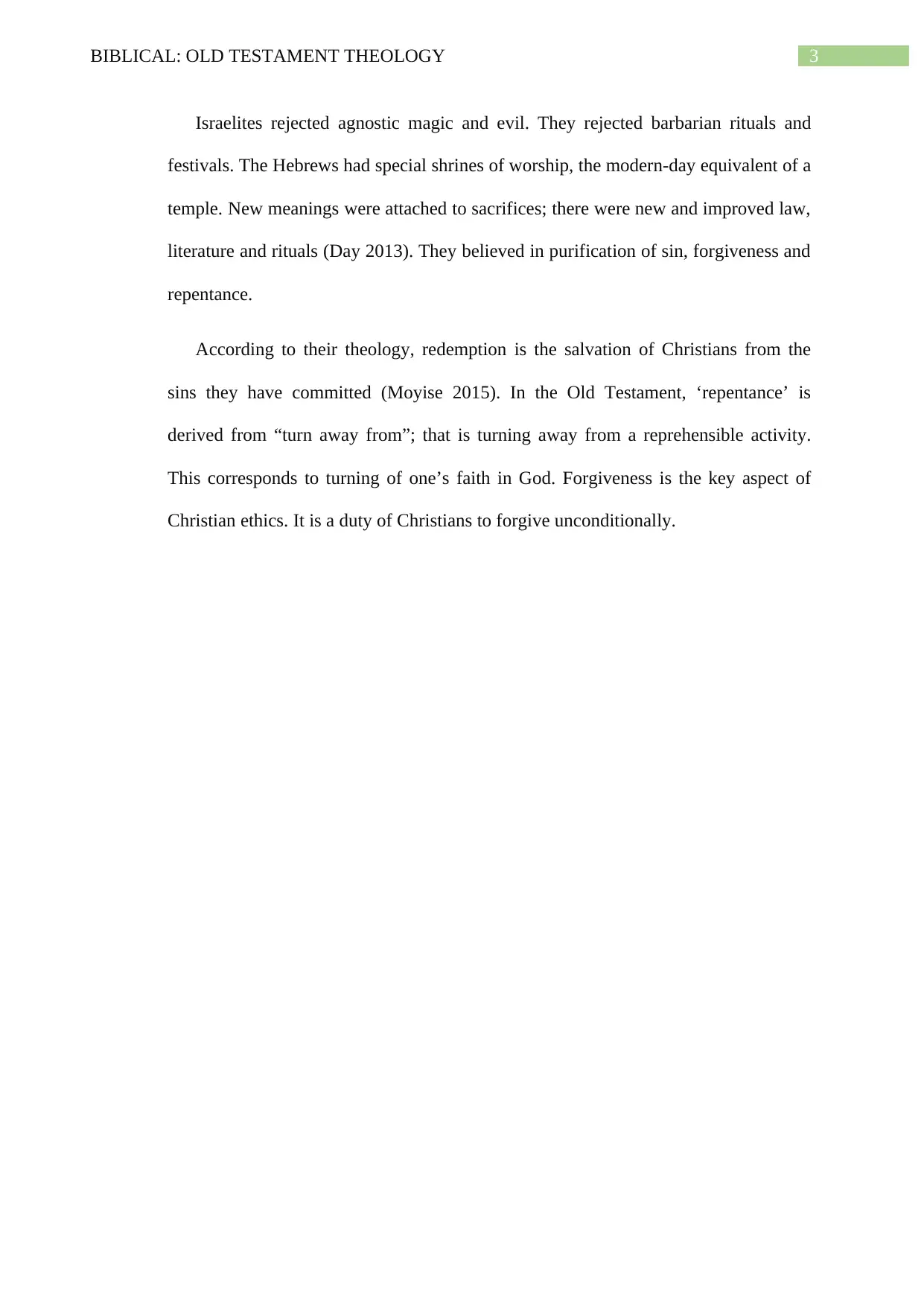
3BIBLICAL: OLD TESTAMENT THEOLOGY
Israelites rejected agnostic magic and evil. They rejected barbarian rituals and
festivals. The Hebrews had special shrines of worship, the modern-day equivalent of a
temple. New meanings were attached to sacrifices; there were new and improved law,
literature and rituals (Day 2013). They believed in purification of sin, forgiveness and
repentance.
According to their theology, redemption is the salvation of Christians from the
sins they have committed (Moyise 2015). In the Old Testament, ‘repentance’ is
derived from “turn away from”; that is turning away from a reprehensible activity.
This corresponds to turning of one’s faith in God. Forgiveness is the key aspect of
Christian ethics. It is a duty of Christians to forgive unconditionally.
Israelites rejected agnostic magic and evil. They rejected barbarian rituals and
festivals. The Hebrews had special shrines of worship, the modern-day equivalent of a
temple. New meanings were attached to sacrifices; there were new and improved law,
literature and rituals (Day 2013). They believed in purification of sin, forgiveness and
repentance.
According to their theology, redemption is the salvation of Christians from the
sins they have committed (Moyise 2015). In the Old Testament, ‘repentance’ is
derived from “turn away from”; that is turning away from a reprehensible activity.
This corresponds to turning of one’s faith in God. Forgiveness is the key aspect of
Christian ethics. It is a duty of Christians to forgive unconditionally.
Paraphrase This Document
Need a fresh take? Get an instant paraphrase of this document with our AI Paraphraser
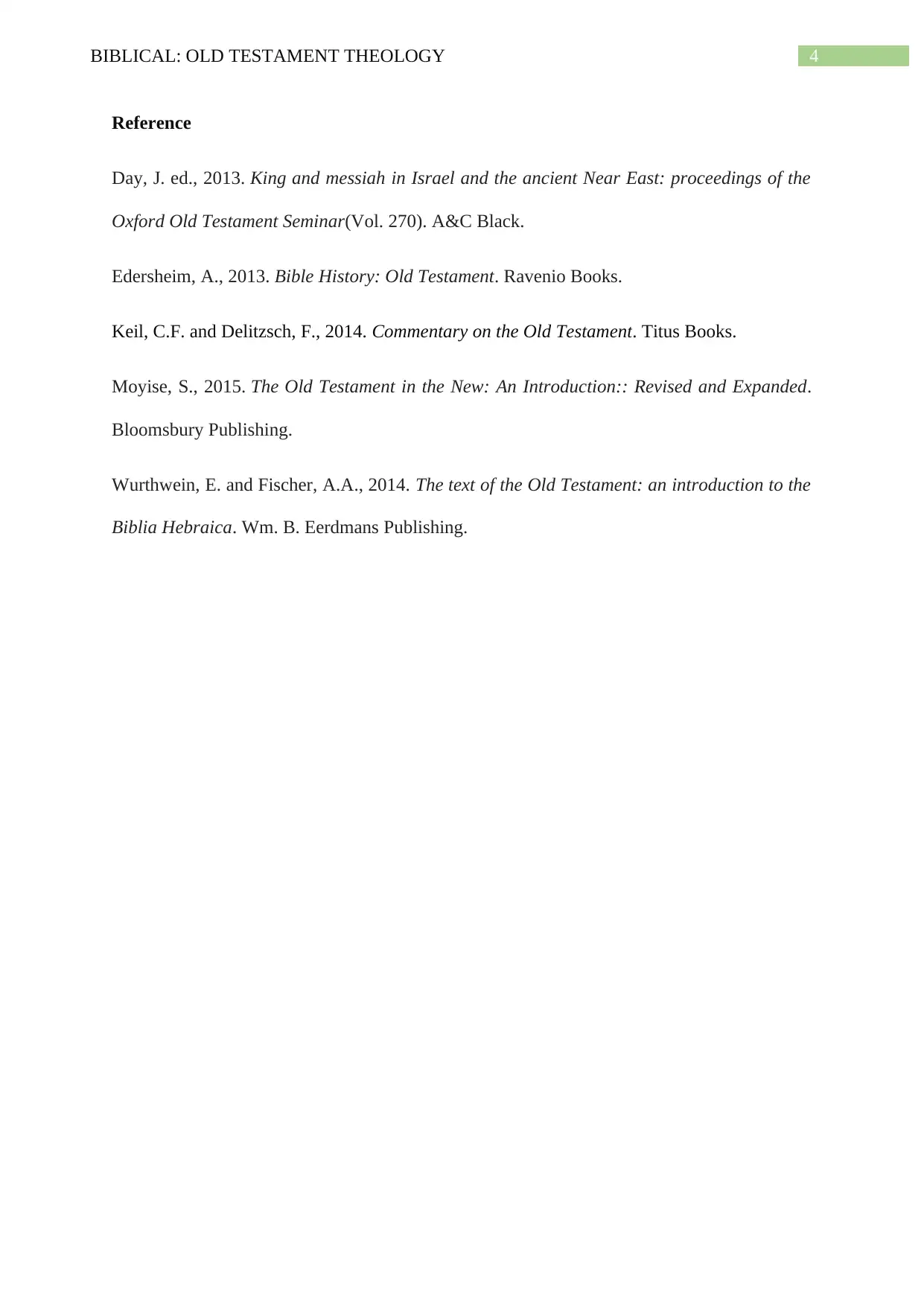
4BIBLICAL: OLD TESTAMENT THEOLOGY
Reference
Day, J. ed., 2013. King and messiah in Israel and the ancient Near East: proceedings of the
Oxford Old Testament Seminar(Vol. 270). A&C Black.
Edersheim, A., 2013. Bible History: Old Testament. Ravenio Books.
Keil, C.F. and Delitzsch, F., 2014. Commentary on the Old Testament. Titus Books.
Moyise, S., 2015. The Old Testament in the New: An Introduction:: Revised and Expanded.
Bloomsbury Publishing.
Wurthwein, E. and Fischer, A.A., 2014. The text of the Old Testament: an introduction to the
Biblia Hebraica. Wm. B. Eerdmans Publishing.
Reference
Day, J. ed., 2013. King and messiah in Israel and the ancient Near East: proceedings of the
Oxford Old Testament Seminar(Vol. 270). A&C Black.
Edersheim, A., 2013. Bible History: Old Testament. Ravenio Books.
Keil, C.F. and Delitzsch, F., 2014. Commentary on the Old Testament. Titus Books.
Moyise, S., 2015. The Old Testament in the New: An Introduction:: Revised and Expanded.
Bloomsbury Publishing.
Wurthwein, E. and Fischer, A.A., 2014. The text of the Old Testament: an introduction to the
Biblia Hebraica. Wm. B. Eerdmans Publishing.
1 out of 5
Related Documents
Your All-in-One AI-Powered Toolkit for Academic Success.
+13062052269
info@desklib.com
Available 24*7 on WhatsApp / Email
![[object Object]](/_next/static/media/star-bottom.7253800d.svg)
Unlock your academic potential
Copyright © 2020–2026 A2Z Services. All Rights Reserved. Developed and managed by ZUCOL.




